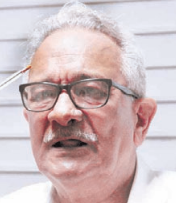Coexistence between Dominican Republic and Haiti requires a legal framework that is complied with

The root of the current border crisis lies in the fact that during the entire republican life, relations between the Dominican Republic and Haiti have not been governed by a legal border framework, maintaining an arbitrary, individualized, corrupt, violent, and unjust control. The authorities have lost confidence in each other and act out of revenge.
This is the conviction of Father Regino Martinez, S.J., as he recounts his 49 years of experience on the northern border, where he learned that we are two brotherly peoples who need to live together based on dialogue, respect, trust, and strengthening credibility.

Regino Martinez
And in the function of this achievement and the overcoming of current problems, the Jesuit priest who by word and example preaches Dominican-Haitian brotherhood makes a warning:
At present, the situation in the Republic of Haiti has two components that generate ungovernability: one, the armed neighborhood gangs, and two, the gang of politicians who have assaulted the State to govern as they please, but only the neighborhood gangs are being taken into account as an evil for governability.
Haiti needs institutionalized services to overcome the current governance crisis. It is crucial not only to fight the armed neighborhood gangs because those who have given them weapons are politicians, business people, and traders. The Haitians have to solve the governance problems; the International Solidarity Force has to cooperate, not impose Haitian personnel.
Those responsible
After pointing out that the border is the result of the interests of the colonialist countries France and Spain, not of the inhabitants of the island, he says: Currently, those who maintain the division, intrigues, and prejudices in the population of the island are the governments of the social elites of each country, taking into account the local capital and the neocolonial interests.
In giving testimony of his experiences, he says: “What has helped me the most to transcend personal prejudices and those induced by the republican elites is the sense of humanity, which makes me aware that we are equal, free people with a shared responsibility:
“How to achieve good living on the island while respecting the cultural identity of each one, doing what is within my reach.”
He then warns that speaking from hearsay and making decisions from outside the border without knowing the border reality is risky and can achieve results different from those required.
People understand each other by talking and maintaining an attitude of service. We have to stand side by side to dialogue, share, respect each other, and do what each one can to achieve coexistence. We need each other. Haiti cannot do without the DR, nor the DR without Haiti.
In visits to the communities, as parish priest of Dajabón, he found that Dominican women who traded in used fabrics bought from Haitian women in Wanament had problems crossing the border with the merchandise acquired in Haiti. They organized 700 vendors in the Association of Women the New Hope of Dajabón (ASOMUNEDA).
But the women talked to the head of the Army so the President would let them pass 80 kilos of clothes without paying taxes through Customs in Dajabón. This is the origin of the legal crossing of merchandise, says the priest and adds:
Already organized the peasants of the Dajabón plain with those of the hills, began in 2005, from Solidaridad Fronteriza, a Jesuit entity that he directed, the visits to the Haitian irregular workers in the organic banana farms where they work and the communities where they live, culminating with the formation of ASOMILIN, Asociaciones Solidarias de Obreros Migrantes de la Línea Noreste (Solidarity Associations of Migrant Workers of the Northeast Line).
Then, he says, came the needs: First, regularization. Solidaridad Fronteriza, in coordination with the Office of Civil Status of Wanament, issued five thousand birth certificates and more than three thousand passports in the consulates of the DR and Haiti in Dajabón and Wanament.
Second, They formed the ASOMILIN Savings and Credit Cooperative, the first legally incorporated association of migrant workers, where they could keep their earned savings safe. Third, Christmas vacation trips. Fourth, the collection of labor benefits. Fifth, festive and cultural celebrations.
“And so, if you want to, you can…, I managed to meet with the Haitians. The economic support for the activities was provided by the beneficiaries themselves, united and organized in ASOMILIN.”
“The beginning of the Dominican-Haitian relations, from town to town, is based on Our Lady of Altagracia and Notre Dame of Perpetual Help, patronesses of both towns, and who makes us aware of our brotherhood. The joint celebrations of the patronal feasts of the Mother of Jesus and our mother, bring us closer, guarantee harmony, because governments pass and the border remains.”


















I am not a Roman Catholic but I believe that this priest is saying what is right and there is much more need for both sides to live as brothers . But it is dangerous for priests to speak out as was seen in San Pedro de Macoris spoke strongly about the disgusting treatment of the sugar cane workers.
they’re not “priests” ,they’re everything but priests …
papist institution hades that very well
Priest are only those with Apostolic succession …
That chain of priesthood was broken when great schism took place in 1054 …
They are wolf’s in sheep’s skin …
It’s clearly stated in Holy Scriptures…